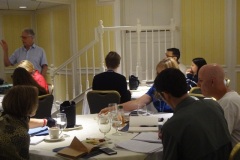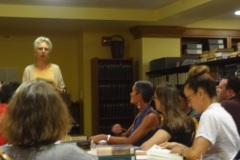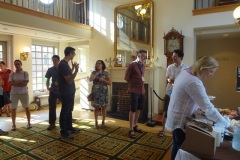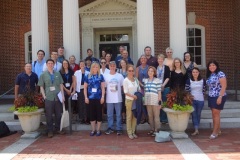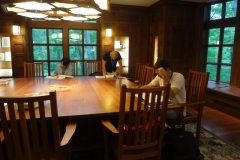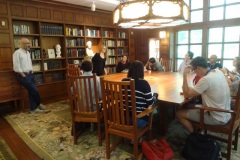Testimonials
Below are excerpts from the anonymous evaluations of the 2017 and 2015 NEH Summer Institutes in Concord on “Transcendentalism and Reform in the Age of Emerson, Thoreau, and Fuller,” which, like the 2022 Institute, were led by director Sandra Harbert Petrulionis and assistant director Diane Whitley-Grote.
“This was a life-changing program. Participating in it enriched my understanding of Transcendentalism – the origins of the movement, the influences these writers had on one another, and the historical context (in particular, abolitionism and the women’s rights movement) which informed Transcendental ideas about nature and liberty. After our discussions and visits, I left Concord feeling like I personally knew these writers, as if I had met them. I also left with several valuable new teaching strategies and research questions.”
“It is impossible to overstate the impact the two weeks I spent in Concord will have on my teaching and scholarship and, I would add, on my personal intellectual development. Having two weeks away from the demands of my institution and my family presented me, a busy college professor and parent, with a rare and precious opportunity: the ability to share a space and a set of experiences with a smart, dedicated group of scholars, and so to foster a two-week-long conversation about history, progressive political change, and Transcendental thought. I will be forever grateful for the tremendous intellectual ferment I was a part of for the two weeks.”
“The NEH Summer Institute was an outstanding educational experience. It will reverberate through my teaching and scholarship for years to come. It will inform the texts that I teach, as well as the context in which I teach them. It has given me new ideas related to curriculum design—whether a course on Literature and the Environment (Green Spaces in Literature) or a general education capstone course on Compassion, Justice, and Service. It has given me new direction in my scholarly endeavors, as I look to integrate my deepening knowledge of the period (specifically focused upon Thoreau) to 20th Century American poets and their representation of the ‘sacred’ in places. I’m exploring if drawing attention to these ‘places’ and the ‘spirit within’ leads us to reform our ways of living in them.”
“I found the entire experience to be exceptional. It was well organized and thoughtfully done. That starts at the top with Sandy and Diane. I thought they were so kind to all of us and so accommodating to our varied interests. They created a welcoming environment for our ideas and encouraged our interaction with speakers and each other. It fostered a learning community that cultivated curiosity and creativity. Visiting Faculty: The visiting faculty were awesome. It’s a rare experience that one gets to hear from so many experts on successive days in a row. It created a total saturation of ideas related to the topics/figures of the period. The presentation styles were all different and worked to illustrate the many different ways that a teacher can explore this material. The visiting faculty were also generous with their time and conversation. I had the opportunity to speak with several of these faculty about lingering questions related to their presentations. The seminar participants in this learning community were wonderful. The kindness and thoughtfulness were unexpected and much appreciated. I didn’t receive a judgmental tone from colleagues about the value or worth of a comment. I did get a sense of the electrical nature of the ideas that were shared in large and small conversations alike. By the end of the day, it felt like my mind was on fire with all of the different things that I was learning from faculty and colleagues. Finally, I enjoyed all of the activities we had. The various tours were so informative and enabled us to understand these places in deeper ways. Overall, it was a well-designed learning experience. I thought Sandy and Diane were excellent directors, and I’m so appreciative of their efforts in making this Summer Institute a rewarding experience on so many levels.”
“I am not the same professor I was two weeks ago. This institute will have a significant effect on the work I do. If I had to put the nature of this change into a single word, I would say that my work will be more *connected*. In the course of this institute I was drawn to the idea of interconnectedness that Bob Gross emphasized in his work on Concord. But I found that it will apply not only to my teaching of Transcendentalism, but also to the way I think about teaching, writing, collaborating, and living an authentic life. Following this experience, I have plans for the redesign of two courses I currently teach and the development of a new course at my institution. I also gained material for some public lectures I will be doing in my community. I formed collaborative networks with other participants and am planning to work on at least two scholarly projects with people from this institute in the future. Furthermore, I am already talking to other participants about the possibility of organizing some conference panels with them.”
“It may be a cliché in educational discourse, but the best word to describe my experience of Transcendentalism and Reform Summer Institute is transformational. For me as a scholar-teacher, this Institute was exactly what I and my colleagues aspire to provide for our students: a transformational learning experience, one that leaves the learner fundamentally changed and newly equipped with the intellectual tools, content, and energy needed to create new knowledge or develop new applications for what we now know. I have already experienced this kind of change in my teaching and scholarship (and I’ll illustrate some of them below), but I’m also certain these transformative effects will continue to unfold in my work with colleagues at my urban, diverse State University, in my collaborations with colleagues from the Institute, and in my current and emerging scholarship. What more could anyone ask of a two-week program? What could be a more effective use of our limited time and our equally limited financial resources?”
“As the only Americanist in my department I often wish that I had colleagues in American literature and culture with whom I could share ideas and materials. This institute provided me with not only new ideas, information, and experiences, but with new colleagues as well. I has changed my sense of the field as I had an opportunity to work with passionate and engaged educators who are committed to intellectual community rather than competition for resources.”
“Overall, the Transcendentalism and Reform NEH institute was an enriching and even life-changing experience. As a young scholar, I can see many ways in which this institute will affect my teaching and scholarship for years to come. In terms of teaching, each world-renown scholar presented their theme in a specific way, embodying pedagogies that serve as a model for my own teaching, whether it is the useful analogies Myerson used during his talk or the active-learning techniques of Lance Newman. In other words, not only do I envision designing a course based on the CONTENT learned in this course, but I can also let the TECHNIQUES of teaching inform my own classroom environment from now on. In terms of scholarship, I was able to bounce off ideas for projects with the various seminar leaders, and I am left with an enthusiasm for future and current projects: I got concrete advice and encouragement from these top scholars, and only this NEH institute could facilitate such a friendly, collaborative environment like this.”
“This was a phenomenal program. I came to it having little background on the topic, but this immersion into Transcendentalism has left me eager to explore the topic further and find ways to integrate it into my teaching and my research. I now have several ideas for modifying some of my courses to incorporate Transcendentalist texts, as well as some of the labor issues that were addressed in our trip to Lowell, MA. As for research, the exposure to these thinkers (Thoreau especially) has challenged me to move beyond my tendency to focus on analyzing narrow issues/problems (which is a characteristic tendency of my discipline) and work to develop and defend a broader ethical view. I am also eager to examine the theme of well-being and ‘the good life’ in our globalized, technological age in light of these Transcendentalist thinkers. I anticipate that I will be grappling with these themes for years to come.”
“This was an absolutely stellar program that provided an in-depth look at the people, writings, and historical context surrounding American Transcendentalism. Every single speaker that we saw was a top-rate scholar. I was deeply impressed. The various field trips were helpful, and I liked that many of the museum/library trips were optional since it was more productive for me to use that time reading in my particular areas of interest (which went beyond the assigned institute reading). Sandy Petrulionis was so thoughtful and helpful. I can’t say enough good things about her in her role as the director of this wonderful program.”
“The Directors Sandy and Diane were always on the ball, enthusiastic, and incredibly generous with their time—-and, most importantly, well-organized. Every single visiting faculty presenter was available throughout the day to talk to: there is no other opportunity I’ve ever had where I could rub elbows with Pulitzer Prize winners and the very TOP scholars in my field in such a cooperative space. When you place 25 scholars and teachers in the same room, there’s no telling what kind of dynamic the group will have, but I have to say that I couldn’t ask for a more supportive, diverse, and generous group of people—-this is without a doubt the highlight of my academic career (if I can say that at the beginning of my career!). There was a good mixture of topics, though at times I wish there were more time for questions, especially since some of the scholars had more of a lecture format. But this is a minor point because several of the scholars had more of a discussion format: overall, it was a great mixture of approaches.”
“This particular institute was transformative! The program’s focus was vital in helping me revise my American Lit I course, and I can clearly see areas that I had left out when I first taught my course. I now feel very confident going forward with my course development, particularly with a better understanding of the historical and social contexts regarding Transcendentalist writers and the connections that came before and after this particular time.”
“The program was excellent, providing me a chance to meet fellow teachers/scholars with an interest in the Transcendentalists, explore the historical contexts of Transcendentalism, and research materials of particular importance to me. I’ve already revised my American Literature survey syllabus in light of what I learned.”
“I am very grateful for this NEH program. The institute exceeded my hopes and expectations. I feel it is a model for how to regenerate scholars at mid-career. We participants will carry with us a new sense of purpose. Many of us felt that we had rarely, if ever, been in the company of so many bright minds and sensitive hearts.”
“This experience was life-changing, offering opportunities for fellowship with fellow authors and scholars, and emboldening me to be more creative and thematic in my teaching. The time afforded for archival research at various libraries allowed me to develop ideas for future projects through hunting down notebooks and diaries of potential research subjects. In relation to my teaching, I have developed a new consciousness. I will more thoughtfully present material to my students on themes of social justice, especially in terms of gender, race, and class, and nurture respect for the non-human.”
“This institute allowed me to finish a paper I have been working on for several months, and start a new paper. For months I had been waiting for access to some of the documents that the institute afforded me. I wouldn’t have been able to complete my projects without the institute, at least not for a much longer time. In terms of my teaching, the institute influenced my thinking about how to present myself in the classroom. I learned a great deal from watching the visiting lecturers. I liked seeing how each lecturer had their own way of going about things. What kind of instructor do I want to be? I began to answer that question at the institute. Furthermore, the rich historical information I learned brought Concord to life for me in a way that I know will translate in the classroom. I am by no means an expert on Transcendentalism and Concord, now, but I have moved steps closer.”
“In all honesty, it is impossible for me to summarize the vast array of information I absorbed during my two weeks in Concord, as I am still processing, reflecting, and reeling from the experience. More concretely, however, I can say that I am completely changing my approach to how I teach these writers, incorporating visuals, historical data, and context into my lesson plans. My scholarship plans are less immediate, but I have ideas for 2 papers and one presentation. Each speaker engaged me in a unique way and the range of style, approach, content, and analysis was refreshingly heterogeneous. I felt honored by each of our presenters, amazed at their breadth of knowledge and delighted to find each of them approachable and open to our crazy questions.”
“Tremendous program! The NEH Summer Institute has given me new perspectives on the subject of Transcendentalism, and it has inspired me to think about Transcendentalism in new ways, both in my research and my teaching. I count this NEH summer institute as among the most important experiences of my professional career.”
“Since my career is still in its early stages, I focused more on the research aspects of the institute. The combination of seminars and library visits was very stimulating. I found myself being more productive than I expected, and that my productivity began right away. (I took the antique anvil in “The Forge” as a subtle reminder to strike while the iron was hot!) It has been several days since I returned home and I am finishing one of the projects that I took with me to Concord. (If it gets published in NEQ or ALH, I’ll be sure to tip my cap.)”
“In addition to the many writing projects I researched, the institute showed me different ways to teach Transcendentalism. As a result, I have a notebook filled with pedagogical strategies and even a sample syllabus that I began drafting in anticipation of future courses, both on the Transcendentalists and survey courses in which I would want to incorporate their writings.”
“I am confident that this institute will have lasting effects on my career. Studying the Transcendentalists in their hometown of Concord among a group of scholars and educators was an experience that I will never forget. Thank you.”
“These two weeks were absolutely transformative. I learned something new every day and was inspired unlike I have been in a very long time, not only due to the incredible speakers and field experiences, but also because of my fellow participants, who were accomplished in their own right. As a result of my time at the Institute, I have two new book project ideas and have already piqued the interest of the editor at Ohio UP on one of the ideas because I emailed her about it. Additionally, I gained personally from the Institute as I was reminded of the importance of living deliberately, thoughtfully, and with conviction and action.”
“I found the Institute thoughtfully planned and executed. The transcendental movement was, in its time, and continues to be understood as multi-faceted in scope and aims, and the visiting faculty’s presentations successfully explored the movement in all its breadth and depth.”
“This was an excellent experience, and I consider myself enormously lucky to have had the opportunity to take part. I attended primarily in order to gather ideas, sources, and strategies for a few courses I teach, and I came away with many more than anticipated—and which I look forward to trying out this academic year. Interacting with Institute facilitators and participants also gave me a number of ideas that will be useful for my scholarship.”
“The institute gave me a richer appreciation for the transcendentalists and their world. The lectures offered by leading scholars in the field and the introduction to the material artifacts and locations relevant to the transcendentalists’ writing helped me understand these writers and their work much better than I did before. This new understanding will enrich the courses I already teach, but will also help me make the case for creating new course offerings at my institution.”
“The visiting faculty were also wonderful—so knowledgeable and generous with their time. What I especially appreciated was that they each took their topic for the day and gave us a general overview of the subject. Each day narrowed our focus a little more and a little more. It was very well organized and each lecturer remained faithful to his or her subject. Q&A time was used for getting more in-depth with subjects of interest to institute participants, but the lectures themselves were very useful overviews.”
“My experience with the Institute was very positive. I learned a great good deal about the principle topic and took away several concrete ideas/projects that will find fruition in my teaching and scholarship. Specifically, the revision of an article length essay will be greatly aided by what I learned. I’m also aiming to develop a grant proposal for a course related to some of the themes we broached, as well as specifically develop another course—informed by the Institute’s topics and themes—to teach at my home institution.”
“The Director and Associate Director were simply outstanding: thoughtful, thorough, attentive, engaged. They both did so much to ensure the logistics of the Institute unfolded smoothly and planned an especially engaging two weeks of learning, collaboration, and reflection. The overwhelming majority of the visiting faculty also were for the most part were top shelf. Each scholar was among the most distinguished in the study of Transcendentalism and reform and nearly all executed sessions that were informative, thoughtful, and chock-full of ideas for my teaching and scholarship.”
“Wonderful. Regarding teaching, every presenter every day said something or referred to a text that will absolutely impact my teaching … and the fact that pretty much all tied their presentations into pedagogy in one form or another was great. The experience of the walking tours &c. also will have an impact—as somebody mentioned, just being able to measure the distance between Walden and Emerson’s house with your feet, or hear the railroad from the pond, informs how we teach … even the tone, to cite one presenter’s words, of how we present the material. There was also the fact that the whole group of scholars was hands-down wonderful, and I got as many ideas from individual conversations with my colleagues as from anything else. As for scholarship … I came looking for inspiration, I guess, and got more than I bargained for. I can’t really point to one thing in particular—it was the cumulative effect of seminars, tours, and atmosphere. I’m excited now to research and write!!!!”
“I had a wonderful experience overall. This seminar is already impacting my teaching and scholarship directly, in the near-term, and I suspect these effects will only grow further into the future. Discussions about pedagogy, and even the nuts and bolts of syllabi, are figuring in my construction of my first-year composition course this fall (as I’ll have my students study authors and events referenced in the seminar and also complete versions of assignments that colleagues exchanged) as well as in larger curricular changes I am leading at my institution. As far as my scholarship goes, this seminar put me into touch with leading scholars in my field, some of whom have already agreed to read selections of my work as I charge toward finishing my first monograph. This sort of connection-building is invaluable for any scholar, particularly junior scholars, and without this seminar I’d have a hard time doing it.”
“The Summer Institute on Transcendentalism and Reform is by far the most meaningful professional experience I have had—and the most powerful learning community I have ever been fortunate enough to join. As one of my new friends and colleagues described it during our final session, my mind and my heart feel totally full. I write this reflection from a computer screen now crowded with more sticky notes than I care to count: new articles and books to read, new assignments and courses to design, new essays to write, old projects to revise with fresh perspectives, and entirely new ways of reading my favorite writers. I could fill pages and notebooks with gratitude for all the specific things that I learned during my two weeks in Concord—and still not do justice to the ways this Summer Institute will motivate my teaching and scholarship. I know my furiously scribbled notes will bring this experience into clearer and clearer focus for my students for years to come. Not surprisingly, though, the people—our group and our project faculty—breathed new life into my love for this subject. At our opening dinner, many of us talked about the thrill of being students again—of finding compassionate intellectual company for the ideas that matter most to us right now. I found that and so much more in Sandy and Diane, our 24 new friends and colleagues, and our project faculty.”
“I arrived at the summer institute with a handful of specific projects in mind—and I found inspiration for all of these from the discussions, the excursions, and of course the people—but I’ve also returned home brimming with SO many entirely new ideas. In practical terms, research-wise: a refined sense of the context and the critical intervention for one essay, a regenerating sense of urgency and a clear point of entry/trajectory for another, and a dream project that’ll serve as a carrot for me along my longer term research agenda. Above all, I feel energized in my writing life by my peers and our shared experiences and by the project faculty, whose remarkable productivity seems to make them only more giving as teachers. For my teaching, the significance of the institute is harder to index—even as I am currently drafting fall syllabi—perhaps because I know it will be so profoundly wide-ranging. I feel challenged and energized to put many of the issues we grappled with at the center of my classes—and they’re already infusing not only my surveys and my seminars, but also my newly designed composition courses. I have no doubt this urgency to re-prioritize difficult topics and texts will sometimes be a little uncomfortable—but in absolutely productive ways.”
“I will return to my home department this fall hoping to impart to my own students even a fraction of the empathy modeled to me by my teachers and peers at this institute. For me, this seemed central both to the transcendentalists and to the intensity and generosity of feeling every single person poured into teaching us to read these figures. I found myself totally immersed in ideas that *truly* matter to me more in these two weeks than I have in years. That kind of immersion is, I think, a rare gift. I’m beyond thankful to NEH and CCHA, Sandy and Diane, and the 2015 group for sharing it with me.”
“This experience deepened my understanding of the Transcendentalists in context with their place and also my historical understanding of Abolition and the important role women played in social reform This understanding is invaluable in my research and will make me a much better teacher of these subjects.”
“This institute was one of the best professional development programs I have ever attended. I would give it an A+. Being immersed in Concord with the world’s experts on Transcendentalism was an experience that will never be topped. My expertise has grown exponentially as a result of my work this summer. My teaching will be directly impacted as I incorporate the lessons and research I was able to complete during the institute. I am now beginning a book proposal on this topic—something I had not imagined prior to my experience. I was sad to leave Concord at the end of session, as I didn’t want it to end!”
“This seminar vastly increased my knowledge about Transcendentalism and the most significant Transcendentalists. Being in Concord, and specifically at the historic Colonial Inn, gave me an invaluable grounding in that specific place and helped me to understand its importance in and influence on the lives of Louisa May Alcott, Ralph Waldo Emerson, and Henry David Thoreau.”
“Interacting with such interesting teachers from around our nation, as well as the distinguished scholars who spoke to us, has definitely transformed the way I will teach American history in the years in the future. I specifically plan to incorporate several texts from these thinkers/writers into each unit of my American history courses. For example, I will have the undergrads read Chapters 2 of “Walden” when we study antebellum culture. Moreover, I will add information about the antislavery movement in Thoreau’s Concord, especially about Concord’s Female Antislavery Society, to the unit dealing with antebellum reform efforts. I will also provide more opportunities for students to learn about African-Americans efforts to end slavery.”
“Inspirational. Even now, over a month later and well into my school term, I’m roiling with topics and ideas for articles and projects engendered by this NEH Institute. I have notebooks full of information and stacks of reading materials, acquired over the two weeks, and as I review them and read into them more deeply I am beginning to prioritize my interests and areas of focus. The breath of issues addressed, from social action to environmentalism to spirituality, means anyone interested in this subject – no matter how adjunct – couldn’t help but be intellectually stimulated by the ideas presented during these two weeks.”
Click photo to see larger version.


